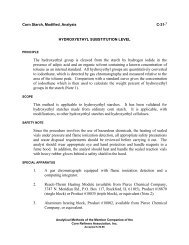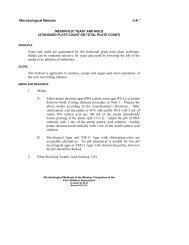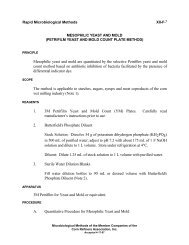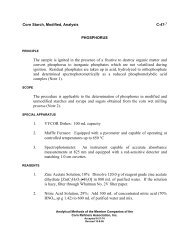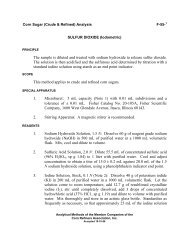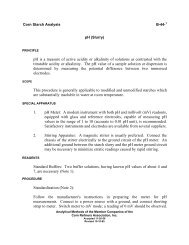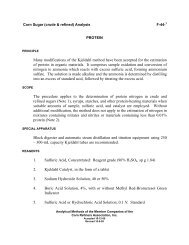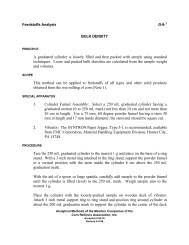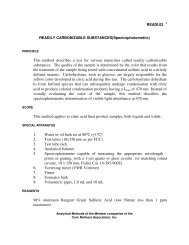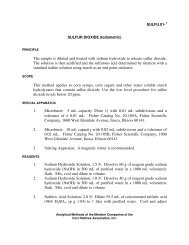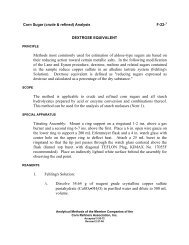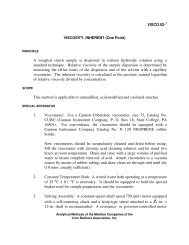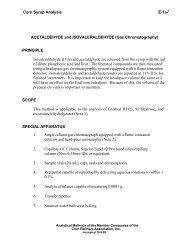The Year in ReviewAudrae EricksonPresident<strong>Corn</strong> Refiners AssociationThe United States is the largest cornproducer in the world. This year, U.S.corn farmers maintained their distinctionas the most abundant and reliable globalsupplier of corn by producing the largest cropon record ever.<strong>Corn</strong> grown on American soil benefitsconsumers throughout the world in a variety ofways—from the golden kernels used to feedanimals to the corn starch used in bindingpharmaceuticals. Products from the cornrefining industry touch human lives all overthe globe by making thousands of foods,personal and health care items, home productsand industrial goods possible.2007 <strong>Corn</strong> AnnualThis year’s <strong>Corn</strong> Annual provides a glimpse ofthe importance of American corn to the globaleconomy. Our featured guest author is wellknown to the corn refining industry and arespected veteran of agricultural policy andpromotion. U.S. Department of Agriculture(USDA) Acting Secretary Charles F. Connershares his thoughts on the impact of exportmarkets for U.S. corn as they relate to price,availability and policy.<strong>Corn</strong> Refiners Association Chairman James P.Zallie of National Starch and ChemicalCompany analyzes the patterns of exports ofrefined corn products over the past twentyyears to provide insight into potential areas formarket developments in the coming years.Sakharam K. Patil, Ph.D., draws on his 30years of experience in the industry to discussthe impact of technological advancements inrefined corn products to help meet the needs ofan expanding global population.Issues of Importance to the IndustryObesityThe national debate on obesity involves animportant health concern facing our nation andraises issues that deserve well-founded,science-based responses. Unfortunately, themedia cover the subject of obesity withvarying levels of expertise and depth that attimes oversimplify the issue by attempting tosingle out specific food ingredients, includinghigh fructose corn syrup (HFCS), as the soleor predominant cause of this multi-facetedsocietal problem.The CRA employs a number of strategies tocorrect the record by providing science-basedfacts about HFCS. CRA’s rapid responsesystem for communicating with journalists andmedia outlets that mischaracterize HFCS hasbeen effective in educating both the media andthe public. Reports that provide inaccurateHFCS information appear to be declining, andwe have begun seeing articles that defendHFCS as a safe and useful ingredient,consistent with the Food and DrugAdministration’s “Generally Recognized asSafe” or “GRAS” determination that wasinitially granted to HFCS in 1983.Several studies published in peer-reviewedjournals in 2007 have added further scientificsupport for our efforts to demonstrate thesafety and value of HFCS. The February 2007issue of Nutrition, for example, includes astudy by Kathleen J. Melanson, et al. on theeffects of HFCS and sucrose on circulatinglevels of glucose, leptin, insulin and ghrelin.The study found no differences in themetabolic effects of HFCS and sucrose.Similarly, Pablo Monsivais and colleagues atthe University of Washington demonstrate thatbeverages sweetened with sucrose, HFCS andaspartame all have similar effects on satiety(feeling of fullness) in a study published in theJuly 2007 issue of the American Journal ofClinical Nutrition. The August 2007 issue ofCritical Reviews in Food Science andNutrition includes an expert review on HFCSand weight gain led by Richard Forshee,Ph.D., of the University of Maryland Centerfor Food, Nutrition, and Agriculture Policy.These experts found insufficient support forthe notion that HFCS could play a uniquecausal role in obesity. The August 2007 issueof Food and Chemical Toxicology includes astudy by Sam Sun and Mark Empieconcluding that those who frequently consumesweetened soft drinks do not have a higherobesity rate than those who rarely drink them.Proactive communication with dieticians,other health professionals and the journalistswho cover this field is another component ofCRA’s engagement in the obesity debate. The2 | 2007 <strong>Corn</strong> Annual
CRA had discussions with relevantprofessional groups at several conferences,including the American Dietetic Association,Institute of Food Technologists, SchoolNutrition Association and the North AmericanAssociation for the Study of Obesity as well asnumerous groups represented at theExperimental Biology conference.CRA works closely with its ScientificAdvisory Panel to assure that itscommunications with the public on the subjectof obesity have a sound basis in the underlyingscience. CRA also interacts with a number ofimportant allied organizations to presentscience-based, factual information concerningrefined corn products.Farm BillHow the U.S. sugar program is structuredunder the next Farm Bill is crucial to ensuringthat the free trade promised under the NorthAmerican Free Trade Agreement (NAFTA) isrealized by January 1, 2008—not only for thecorn refining industry, but for many other foodand agricultural commodities as well. If anyelement of the sugar program restricts orotherwise negates free trade in sugar betweenthe United States and Mexico, then cornsweeteners will pay a very steep priceincluding loss of jobs to our industry. If theUnited States does not live up to its NAFTAcommitments on sugar, we can be certain thatMexico will come under intense politicalpressure to nullify its NAFTA commitmentsfor numerous high value U.S. exports.The CRA worked diligently to ensure that theinterests of the corn wet milling industry weretaken into account in the House and Senate2007 Farm Bills. Both the House and Senatelegislation included unfettered access forMexican sugar imported into the UnitedStates, ensured that managed bilateral trade ofHFCS with Mexico was not permitted andguaranteed that any sugar for ethanol programwould operate under a competitive bidarrangement by the USDA.TradeAs we have seen with the NAFTA and theCentral American-Dominican Republic FreeTrade Agreement (CAFTA-DR), unrestrictedtrade is an important tool in expanding exportmarkets. While regional trade agreements arepositive developments and strongly supportedby the CRA, the best path for free trade isthrough global negotiations under the WorldTrade Organization (WTO). Talks are ongoingto finalize a framework agreement for theWTO Doha Development Agenda. Significantbehind-the-scenes efforts continue to forge abreakthrough. The CRA supports a final WTOagreement that significantly opens newmarkets for refined corn products.The House of Representatives recentlyapproved a free trade deal with Peru andShipments of Products of the <strong>Corn</strong> Refining Industry – 2006Starch Products (includes corn starch, modified starch and dextrins)6,541,956,000Refinery Products (includes glucose syrup, high fructose syrup, dextrose, corn syrup solids, maltodextrins) 33,061,474,000High fructose corn syrup—42%10,290,837,000High fructose corn syrup—55%+13,135,413,000Total HFCS23,426,250,000Total - Domestic Basic Products39,603,430,000Total - Export Basic Products2,540,965,000<strong>Corn</strong> oil (crude and refined)1,233,337,000<strong>Corn</strong> gluten feed and corn oil meal10,620,928,000<strong>Corn</strong> gluten meal2,645,418,000Steepwater1,413,841,000TOTAL SHIPMENTS58,057,919,000Compiled for the <strong>Corn</strong> Refiners Association by VERIS Consulting, LLC. Statistics represent shipments by members of theassociation. Shipments are in pounds, commercial weights, and do not include co-products derived from ethanol production.2007 <strong>Corn</strong> Annual | 3



